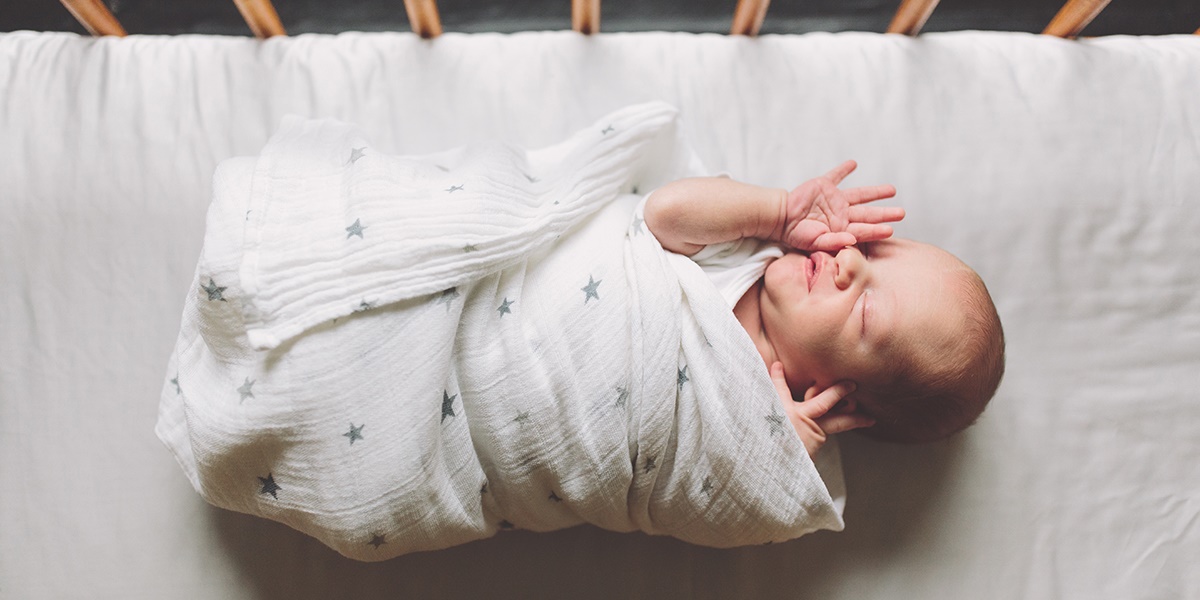
You’ve heard the phrase “sleeping like a baby,” but when you’re an expecting mama it’s truly hard to anticipate how much your baby will sleep once they arrive (not to mention when). While every newborn is, of course, different, here are the basics of what you can expect from your little one’s sleep habits during their first few weeks of life.
How Much Will My Newborn Sleep?
Your newborn will sleep the majority of the day—typically 18 to 20 hours (if not more!) total during a 24 hour period. The tricky part for new parents, however, is that this sleep typically only comes in 1 to 2 hour increments due to waking up for feedings (yes, even overnight at first. Hello, sleep deprivation!). If you’re curious about how much sleep your little one is getting—track it!
There are a lot of apps that can help you log baby’s sleep—but a plain old paper and pencil will do the trick, too. In the early newborn days, there isn’t usually a typical schedule or pattern your baby will follow, aside from sleeping, eating, burping, changing, and sleeping some more. While tracking can keep you informed, babies vary day to day, so don’t let the tracking become a stressor.
How Can I Teach My Baby Good Sleeping Habits?
Fun fact: while some babies are naturally good sleepers, for others it takes some learning and practice! Babies aren’t developmentally ready to “sleep train” until at least five months old. While soothing practice can help in the newborn and early infancy periods, this is not the time for “crying it out.” This it he time for building trust with the baby by ensuring they get attention and comfort when they feel distressed.
While babies don’t develop “regular,” longer sleep cycles until closer to 6 months of age, there are definitely things you can do to help them on their way to solid, independent sleep habits:
- Learn baby’s sleepy signs: As you get to know your little one, you’ll begin to notice their behavior when they’re starting to get sleepy. Their cues could include yawning, eye-rubbing, rubbing their hair—every baby is different! It’s important to start the process of putting them to sleep when they’re ready—if you wait too long, or try to keep them awake, they can become overtired. And trust us—you don’t want an overtired, cranky baby on your hands.
- Put baby down before they’re asleep: While it can be tempting to rock your little one until they’re fast asleep—and then everrrrrr so carefully lowering them into their crib or bassinet—putting your little one down while they’re drowsy will help teach baby how to fall asleep on their own.
- Give them a moment: When you hear your baby fussing, wait a minute or two to see if they can settle themselves or fall back to sleep on their own (see the bullet point above!). If baby’s crying continues, check on them—but try not to turn on the light or pick them up immediately. Try some shushing or gentle pats on their chest (remember: baby should always sleep on their backs!)—then if they’re still worked up, maybe a feeding or diaper change is in order.
- Nighttime = quiet time: When you do need to feed or change baby in the middle of the night, keep the room as quiet and dark as possible. Try not to say much or play with baby, as the more stimulation you provide, the more awake they may become. Most sleep experts recommend that babies sleep in a completely dark room, aided by white noise to minimize other distracting noises
- Wrap baby up: Babies are notorious for their startle reflexes that cause them to jerk and flail their arms and legs (and inevitably wake themselves up). To help them feel snug and minimize their involuntary movements, use a blanket to swaddle them (tip: ask a nurse to show you how in the hospital. They’re masters!), or a velcro swaddler.
What Should I Do if My Newborn Won’t Sleep at Night?
Some newborns simply don’t get the memo that they’re supposed to sleep more during the nighttime than they do when the sun is up (known as day-night reversal). While this exhausting newborn stage doesn’t usually last long, here are a few things to try and help your party animal get back on track:
- Make daytime sleep noisy: We’re not recommending that you practice your drums while baby is napping—but allow baby to nap in areas of the house that have a bit of noise going on (or even while you’re out running an errand).
- Make a nighttime routine: A soothing, calm and quiet nighttime routine (think: warm bath, soft singing, dim lights, etc.) can help signal that it’s time for sleep. Many sleep experts also recommend a white noise machine on a soft setting to help block out noises that could disturb them, and help your baby connect sleep cycles with less frequent wake-ups.
- Keep nighttime interactions limited: As we shared above, do your best to quickly change, feed and burp your little one at night with as little stimulation as possible.
And mama—the most important thing you can remember during the early newborn days is to lower expectations about what you or baby “should” do in terms of their sleep habits. Some days are all about survival! Concentrate on baby’s feedings, diaper changes, and getting all of those sweet snuggles—the newborn phase simply isn’t the time to worry about strict routines.